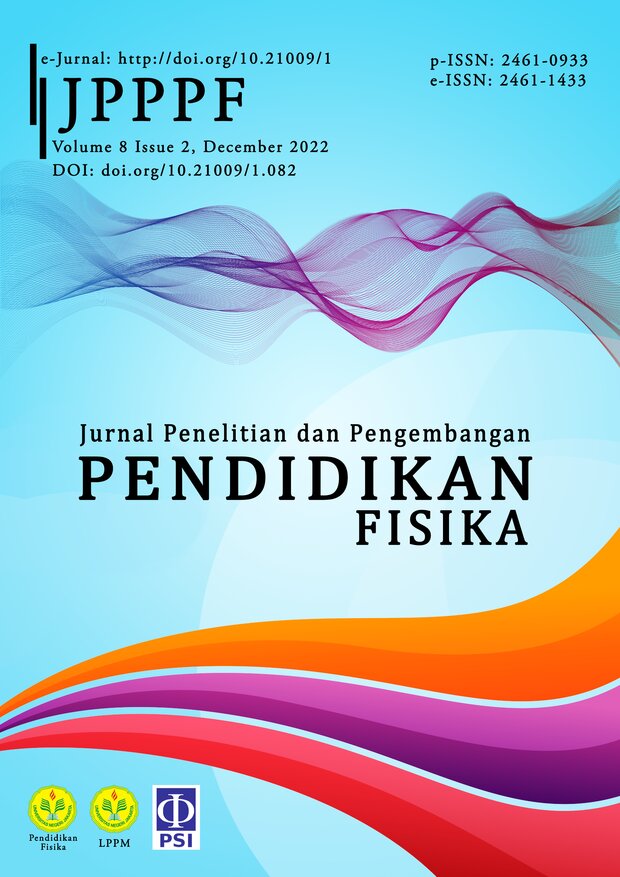Understanding The Nature of Science (NOS) of In-Service Science Teachers: Instructional Practices and Their Implications on Renewable Energy
DOI:
https://doi.org/10.21009/1.08213Keywords:
NOS, science teacher, renewable energyAbstract
The purpose of this study was to determine the understanding of science teachers about the nature of science (NOS) and its instructional practices and implications for renewable energy. Surveys and interviews were conducted on science teachers and elementary, middle, and high school/vocational school students in this study. The instrument used was adapted from the NOS questionnaire instrument and interview questions Abd-El-Khalick, Bell, and Lederman, then developed and refined according to the respondents to measure NOS understanding and instructional practice. Questions added regarding teaching about renewable energy. This research is a qualitative research conducted online on science teachers in Java, Indonesia. Then the contents of the questionnaire are projected on the NoS understanding rubric which is divided into don't understand the NOS aspect yet, little understanding of the NOS aspect, and know and understand aspects of NOS. While the results of the interviews are presented in a qualitative descriptive manner. The results showed a lack of understanding of science teachers about NOS and its instructional practices. Understanding is still very lacking in the tentative aspects, observation and inference, as well as theory and law. The teaching of renewable energy that can train students' NOS which is felt urgent to be taught is also not applied by the teachers in their teaching. Various obstacles were expressed such as immature preparation, limited learning time, and lack of understanding. This resulted in poor implementation of aspects of NoS in classroom learning which had an impact on students' understanding.
References
Abd-El-Khalick, F, Bell, RL & Lederman, NG 1998, ‘The nature of science and instructional practice: Making the unnatural natural’, Science Education, vol. 82, no. 4, pp. 417-436.
Allchin, D 2017, ‘Beyond the Consensus View: Whole Science’, Canadian Journal of Science, Mathematics and Technology Education, vol. 17, no. 1, pp. 18-26, https://doi.org/10.1080/1 4926156.14922016.11271921.
Archer, L, DeWitt, J, Osborne, J, Dillon, J, Willis, B & Wong, B 2010, ‘Doing’ Science versus ‘Being’ a Scientist: Examining 10-and 11-year-old schoolchildren’s constructions of science through the lens of identity’, Science Education, vol. 94, no. 4, pp. 617-639, https://doi.org/610.1002/sce.20399.
DeHaan, RL 2009, ‘Teaching Creativity and Inventive Problem Solving in Science’, CBE-Life Sciences Education, vol. 8, no. 3, pp. 172-181.
IRENA 2014, ‘Rethinking energy: towards a new power system’, The International Renewable Energy, Agency (IRENA).
Irzik, G 2013, ‘Introduction: Commercialization of academic science and a new agenda for science education’, Science & Education, vol. 22, no. 10, pp. 2375-2384, https://doi.org/10.1007/ s11191-013-9583-8.
McComas, WF 2008, ‘Seeking Historical Examples to Illustrate Key Aspects of the Nature of Science’, Science & Education, vol. 17, no. 2, pp. 249-263, https://doi.org/10.1007/ s11191-007-9081-y.
Müller, S & Reiners, CS 2021, ‘Tentativeness And Sociocultural Embeddedness - Resistant Myths About Nature Of Science?’, Proc. ESERA, pp. 760-769.
Osborne, J, Collins, S, Ratcliffe, M, Millar, R & Duschl, R 2003, ‘What “Ideas-about- Science” Should Be Taught in School Science? A Delphi Study of the Expert Community’, Journal of Research in Science Teaching, vol. 40, no. 7, pp. 692-720, https://doi.org/610.1002/ tea.1010
Ozdemir, G & Dikici, A 2017, ‘Relationships between scientific process skills and scientific creativity: Mediating role of nature of science knowledge’, Journal of Education in Science, Environment and Health (JESEH), vol. 3, no. 1, pp. 52-68.
Patel, D, Fleming, SM & Kilner, JM 2012, ‘Inferring subjective states through the observation of actions’, Proc. R. Soc. B, vol. 279, no. 1748, pp. 4853-4860, https://doi.org/10.1098/rspb.2012.1847 PMID: 23034708.
Perla, R & Carifio, J 2008, ‘Can our Conception of the Nature of Science be Tentative without Qualification?’, Journal of Education Thought, Autumn, vol. 42, no. 2, pp. 127-150.
Prachagool, V & Nuangchalerm, P 2019, ‘Investigating the Nature Of Science: An Empirical Report on the Teacher Development Program in Thailand’, Indonesian Journal of Science Education, vol. 8, no. 1, pp. 32-38, https://doi.org/10.15294/jpii.v8i1.17275.
Sasseron, LH & Carvalho, AMP 2011, ‘Alfabetização Científica: Uma revisão bibliográfica [Scientific Literacy:A bibliographical review]’, Investigações em Ensino de Ciências, vol. 16, no. 1, pp. 59-77.
Schwartz, R 2007, ‘What’s in the world?’, Science Scope, vol. 31, no. 2, pp. 42-47.
Schwarz, B, Dreyfus, T & Hershkowitz, NHR 2004, ‘Teacher Guidance Of Knowledge Construction’, Proceedings of the 28th Conference of the International Group for the Psychology of Mathematics Education, vol. 4, pp. 169-176.
Sooriyaarachchi TM 2015, ‘Job creation potentials and skill requirements in, PV, CSP, wind, water-to-energy and energy efficiency value chains’, Renew Sustain Energy Rev, vol. 52, pp. 653-668.
UNESCO 2012, ‘Technical Vocational Education and Training (TVET)’, Education for Sustainable Development (ESD), ED/PSD/ESD/2012/PI/4/ED/; 2012.











